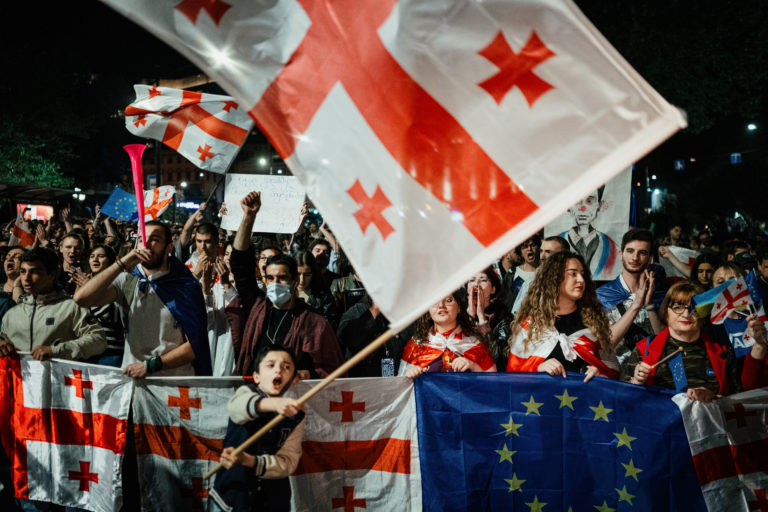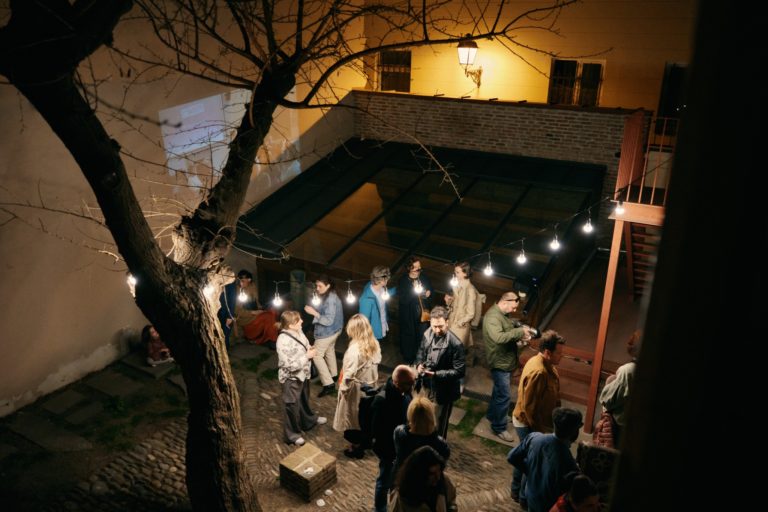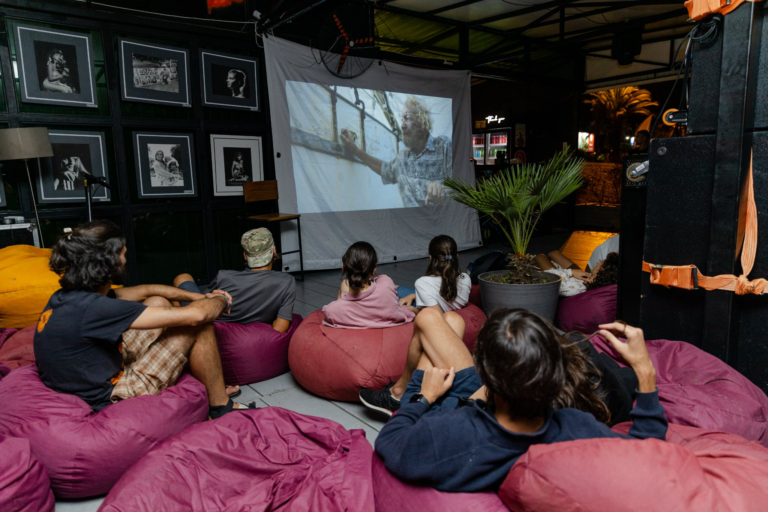Author: Maradia Tsaava
Tbilisi, the city with vast experience in rallies, witnessed an unprecedentedly huge demonstration on April 28th, with tens of thousands of people marching on Rustaveli Avenue chanting “Yes, to Europe! No, to Russia!”. The march on the warm Sunday evening of April 28th, was only one out of permanent protests going on for more than a month in Tbilisi.

Protest – © Tako Robakidze
It was on April 3rd when the ruling Georgian Dream party re-initiated Foreign Agent bill–the one that sourced massive protests in Tbilisi last spring, forcing the parliament to back up and vote down the legislation.
Even though the Georgian Dream made a strong assurance they would not reconsider the bill, one year after, and just 6 months before the parliamentary elections, Rustaveli Avenue in Tbilisi is again flooded with people protesting what they already rejected last year–the ‘Russian Law’.
What is the problem?
This year’s Transparency of Foreign Influence bill is no different from the Agents of Foreign Influence bill of the last year. Except for the wording, nothing has changed–neither the essence of it, nor the critical reaction.
The word Foreign Agent in the bill is transformed into Foreign Influence this year, requiring all media and non-profit organisations to register as “pursuing interests of a foreign power” in case they receive more than 20% of their income from abroad–just like the legislation of Russia’s Foreign Agent Law, which crushed the civil society and independent media in the country since its introduction in 2012.
Georgia is facing the threat to fall under the same trap and end up in this dead-end, which has no way back to democracy, and freedom of speech and expression. Whereas, the country has never been this close to the European Union: after forcing the government to withdraw the legislation, Georgia was granted the European Union candidate status in December 2023.
A few months later, the country has to fight for its European track again with non-stop rallies around the parliament, while inside the parliament the adoption procedures are pulled out as much as possible.
The European parliament and US senators fully support the position of Georgian people, calling the government to withdraw the legislation, as it is undermining Georgia’s European future and its relations with the U.S.
In response, the Georgian Dream is not only rejecting the criticism, but calls for governmental rally supporting the bill in front of the parliament and addresses to violence.

Doca event – © Giorgi Kolbaia
What will be affected?
Alongside the rallies, more than 100 non-governmental and media organisations suspend cooperation with the government until the bill is dropped, claiming they will never register under the label of “pursuing interests of a foreign power.”
“First of all, this label is problematic, disrespectful, and harming. Organisations serving the society and doing public good that the government has to be doing, will be labelled as pursuing someone else’s interest, instead of serving the interest of Georgia,” says Giga Bekauri, the head of Guild–independent professional union for culture.
“Secondly, this label is problematic in legal terms. Identities under this label might get limitations in functioning. This can cause mistrust and confrontation in the society and might end with the organisations shutting down.”
Overall, there are more than 10.000 non-governmental organisations registered in Georgia, functioning under international funding and actively participating in economic development, agriculture, minority rights, healthcare, cultural and historical heritage, education, environment, media, etc.
To pass the ‘Russian Bill’ is to put all the public good Georgia has been gaining since its independence under question.
- Independent media shut down
In a super polarised media environment, mostly owned and run by political interest, internationally-funded online media is the only stream of objective and transparent journalism, where voice of people can be heard.
“We are serving the interest of Georgian people, nobody else,” says Zura Vardiashvili, co-founder of online media Publika founded in 2019, covering general news.
“First of all, we will not register under this offensive label and secondly, we will not be able to function. Like in Russia, this law will bring more limitations, giving the government access to our confidential information. We can be declared as foreign agents operating against the national interest any time they desire.”
One of the important parts of the dubbed Russian legislation is the obligation to fill out a declaration annually. This, as Georgian Dream claims, will bring transparency to the international money spent in Georgia. However, organisations have a very clear argument opposing in this regard.
“90% of media managers’ work is filling out the declarations annually, monthly, and even weekly, reporting where and how the money was spent,” says Lika Antadze, executive director of Chai Khana media.
“Government has full access to financial data and is able to make a full investigation any time. Therefore, it’s clear that transparency is not the goal of Georgian Dream.”
Chai Khana media, operating in south Caucasus for 10 years already, is a platform encouraging local journalists, documentary filmmakers, and photographers to seek and collect unique stories that are left behind in the news.
Chai Khana has also become one of the first distribution platforms for documentary films by launching Kinedok, as part of an international network. Operating in Georgia for 2 years only, Kinedok has already arranged more than 100 alternative screenings with more than 2000 attendees, starting from the locations high up in the Georgian mountains, ending with the big cities.
“Under this bill, authors from south Caucasus will lose Chai Khana as a platform for experiment and a source of additional income. And the audience will lose Kinedok as a source of information to watch documentaries for free. All other countries of Kinedok’s network will go on screening films in different alternative places, while Georgian audience will be left aside,” Antadze says.
- Cinema under threat
Georgian cinema has been facing difficulties even before the “Russian Law.” The one and only financial source for Georgian filmmakers, the Georgian National film Centre has been taken over by the government last year, giving out the signs of censorship. This led more than 450 film professionals to boycott the film centre.[1]
Salomé Jashi, Georgian documentary filmmaker, who’s legendary Taming the Garden was the main target of censorship and was banned from the cinema, co-founded DOCA (Documentary Association of Georgia) to resist the oppression in documentary cinema and find ways for future development. Now, DOCA is also under threat.
“We are also funded by several international organisations like everybody else, because Georgia has very limited financial resources. Only with the help of international donors are we able to support Georgian authors, who’s artistic ideas will now be considered as the voice of a financier.”
“Under this law, developing Georgian documentary filmmaking will be considered as developing an interest of some foreign power. This puts us under the risk to lose our donors and shut down,” Salomè says.
Although it has only been operating for a year and a half, DOCA has already managed to provide financial support to filmmakers, organise industry discussions, set up a regular film club at the movie theatre with growing audience, begin conducting research works, etc.
“We started from zero and we are growing day by day. Now we are under the risk to lose everything we gained. But cinema is only a part of the risk we are under. The whole country is under threat.”
- Theatre rebel
Theatre this year has been the pedestal of the protest against the “Russian Law.” Starting from the Vaso Abashidze New Theatre, stage after stage actors and directors have been declaiming ‘No to Russian Law’ directly to the audience.
Theatre in Georgia is mostly State-funded and has often been accused of taking the government’s side in crucial moments. But this year, theatre has played one of the biggest roles in denying the dubbed Russian bill and calling for protest, even the State-owned ones.
But some independent theatres have already faced difficulties. Ioseb Bakuradze, the founder of the Movement Theatre, already got a denial from a German partner for future collaboration.
“I already staged one performance in Gallus Theatre in Frankfurt. I was going to stage one more performance in Koln, but the German side is already concerned, refusing any future collaboration in case the ‘Russian Law’ is adopted.”

Kinedok screening – © Lasha Phalavandishvili
Georgia’s future
Along with media and culture, this law is going to affect all different social groups, except big business.
“A few big non-governmental organisations have definitely deserved criticism, but fighting against them will affect the whole sector: eliminating the chances to defend labour rights, preserve cultural heritage, protect national resources, and proceed with crucial healthcare programmes saving thousands of peoples’ lives,” says Giga Bekauri, the head of the independent professional union.
“Sexual minorities, people with disabilities, children, and women undergoing domestic violence, farmers, people living along the occupation line–everybody will be affected,” explains Ana Shalikiani, school teacher and co-founder of Laboratory of Georgia, supporting young and female entrepreneurs in Kutaisi, western Georgia. “This law will muzzle and chain us more and more.”
The parliament adopted the bill on May 14th with 84 votes, but President Salome Zourabichvili still has time to veto the law. The procedures of final adoption will last up to two weeks and then, Georgia will have its final verdict in which direction the country is heading toward–to the West or to the North.
[1] This boycott, as well as the whole Georgian Cinema Is Under Threat movement, has been documented in the Reset! Atlas of Independent Culture and Media, in its first volume Expressions of Resistance: Navigating Independent Culture Through Adversity, in an article entitled “Georgian Cinema Is Under Threat–Independent Cultural Movements in Resistance” by Tiko Nadirashvili.
To follow the evolution of this situation in Georgia, click here.
Published on May 16th, 2024
About the author:
Maradia Tsaava is a freelance journalist and documentary filmmaker working with different local and international media organisations. She has been writing stories for JAmnews Georgia, Institute for War and Peace Reporting and is the author of two documentary films. Her feature Water Has No Borders was premiered at DOK Leipzig International Competition 2021 and got Human Rights Award at Trento Film Festival. In 2023, Maradia’s short documentary Dreamland won the best short documentary competition at CinéDoc Tbilisi.